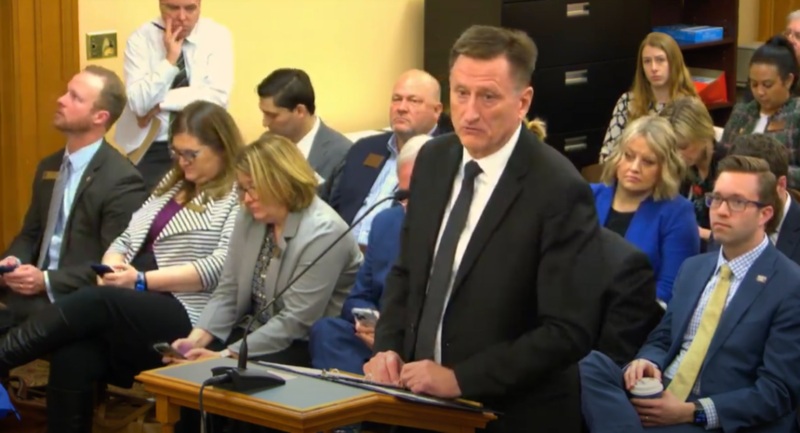Kansas state agencies support raising retention, hiring bonus cap to $10,000 annually

TOPEKA — The secretary of the Kansas Department of Corrections said Tuesday public safety was jeopardized by the agency’s 550 job vacancies and operation of six facilities with uniformed staff shortages surpassing 25%.
Corrections secretary Jeff Zmuda estimated the agency would spend $16.6 million on overtime to deal with workforce gaps at the state’s nine corrections facilities by end of the fiscal year in June.
“KDOC continues to experience critical staffing shortages that make our workplaces and communities less safe,” Zmuda told House budget committee members. “We are not alone in this challenge as nearly every private and public employer face labor shortages each day.”
Zmuda joined administrators of several state government agencies to urge the Legislature to approve House Bill 2277. It would increase to $10,000 the maximum annual retention, hiring and referral bonus provided individual state employees. The existing cap of $3,500 had proven insufficient in the tight labor market, he said.
“We believe bonuses have become somewhat commonplace in corrections, perhaps even expected by applicants, as part of a competitive compensation package,” Zmuda said.
Rep. Troy Waymaster, a Bunker Hill Republican and chairman of the House Appropriations Committee, left open the possibility the bonus program could be part of negotiations on the new state budget at close of the legislative session.
Under the bill, the monetary cap of state government bonuses would be raised to $10,000 and statutory impediments to hiring, recruitment and retention bonuses would be removed. The bonuses would have to be approved by the governor and wouldn’t apply to the legislative and judicial branches, because governors don’t have jurisdiction over those branches of state government.
Existing state law allowed employees to receive up to $3,500 for meritorious service, innovation, volunteerism and length of service. If a state worker developed a plan to save the state government money, that individual could receive 10% of the cost reduction or a maximum of $5,000. However, current Kansas law doesn’t permit executive branch agencies to issue hiring, recruitment and retention bonuses.
Scott Brunner, deputy secretary of the Kansas Department of Aging and Disability Services, said state health facilities in Larned, Osawatomie, Parsons and Topeka had ongoing issues with staff vacancies. The Larned and Osawatomie state hospitals relied on staffing agencies to fill nursing and direct-care positions that cost the state two to three times the salary of a full-time state employee, he said.
“For nursing and licensed positions, such as social workers or psychologists, the labor market is very competitive,” Brunner said. “Other employers seeking similar credentialed professionals are offering signing bonuses that are not allowed for state employees. The hospitals also cannot give a bonus to an existing employee if they encourage someone to apply or recruit another employee.”
Representatives of the state departments of labor, transportation, and children and families endorsed the House legislation.
“As a state agency, our salaries and benefits are often not competitive enough with the private sector to retain our valuable staff,” said Amber Shultz, secretary at the Kansas Department of Labor. “Giving agencies more flexibility to offer employee bonuses as an incentive will boost morale and create a more positive work environment by motivating and rewarding hard-working employees.”
Calvin Reed, acting secretary of the Kansas Department of Transportation, said the agency would welcome a new tool for recruiting and retaining employees. He said escalation of construction activity on the Eisenhower Legacy Transportation Program necessitated staff growth.
KDOT has authority to fill 2,150 full-time equivalent positions and was striving to bring people on board to fill 475 jobs. Annual turnover at KDOT since 2018 averaged 20.5%, Reed said.
“Practically, this means that as soon as we fill a position, one, and at times two, positions are being vacated,” Reed said. “Although KDOT fills around 500 positions a year, we are barely keeping up with turnover.”
Susan Gile, executive director of the Kansas Board of Healing Arts, said the board also endured difficulty in hiring since onset of the COVID-19 pandemic. She said the House bill could broaden hiring advantages of big state agencies receiving large amounts of state and federal funding.
To level the field, Gile recommended the Kansas Department of Administration establish a recruitment and sign-on bonus fund available to all Cabinet and non-Cabinet agencies.








